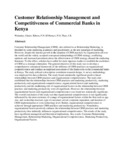| dc.description.abstract | Customer Relationship Management (CRM), also referred to as Relationship Marketing, is heralded by some marketing academics and practitioners as the new paradigm of marketing. However, despite the intense growth in the adoption of CRM practices by organizations all over the world and the widely accepted conceptual underpinnings of CRM strategy, conflicting opinions and increased pessimism about the effectiveness of CRM strategy abound the marketing literature. To this effect, scholars have called for more rigorous studies
to establish the usefulness of CRM as a strategic orientation.
The general objective of this study was to develop a comprehensive conceptual framework of the influence of CRM practices on organizational competitiveness and conduct an empirical assessment of the framework on the commercial banks in Kenya. The study utilized a descriptive correlational research design. A survey methodology was employed for data collection.
The study found statistically significant positive linear relationships between CRM practices and organizational competitiveness. The study also established that the relationships between CRM practices and marketing productivity, marketing productivity and organizational competitiveness, organizational factors and marketing productivity and the moderating role of organizational factors on the relationship between CRM practices and marketing productivity were all significant. However, the relationship between organizational factors and organizational competitiveness was found not statistically significant. The overall conclusion of the study was that organizational competitiveness is not significantly influenced by the mere existence of a range of organizational factors within the firm such as age, size, and ownership structure, type of customers served, corporate reputation, and duration of CRM implementation or even technology level. Rather, organizational
competitiveness is achieved through appropriate CRM practices and marketing productivity.
Nonetheless, organizational factors positively enhance the relationship between CRM practices and marketing productivity thus indirectly influences organizational competitiveness. The results of the study have significant managerial and theoretical implications.
Key words: Customer Relationship Management, Relationship Marketing, Organizational Competitiveness, Marketing Productivity, Organizational Factors. | en |

